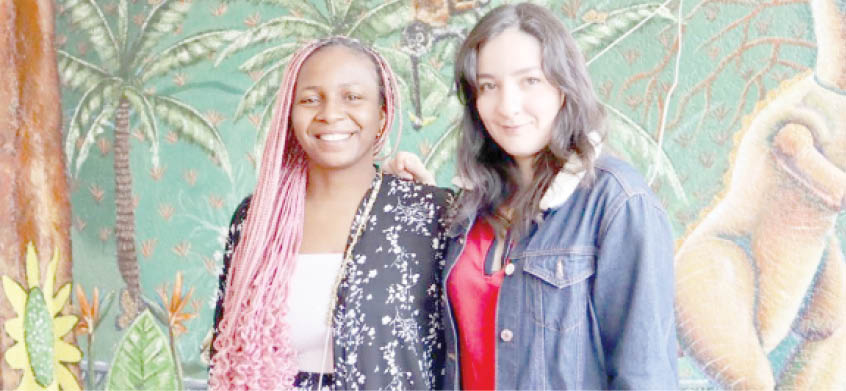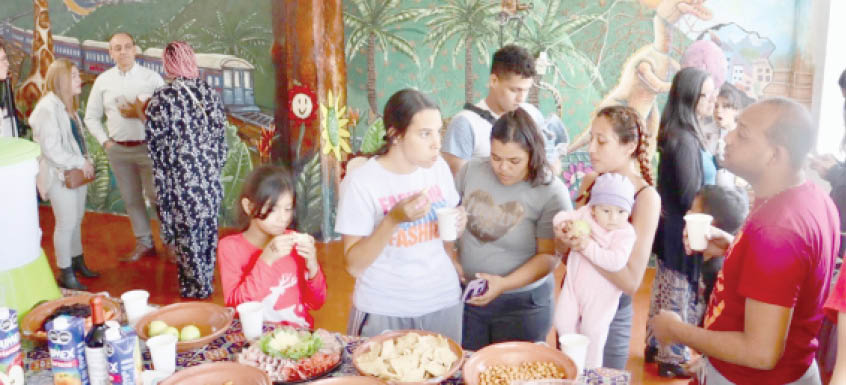Exploring the Mexican culture has broadened my horizon – Ikegwuonu
Chidimma Urunwa Ikegwuonu is a Nigerian artist who, through the Metis Mobilities Program, was able to partner with Mexican artist Priscilla Martinez on a workshop with migrant kids, using art as a means of expression for the kids to be artistically expressive. In this interview with Daily Trust on Sunday, Ikegwuonu narrates his experience working […]

Chidinma Urunwa and Priscila Martinez
Chidimma Urunwa Ikegwuonu is a Nigerian artist who, through the Metis Mobilities Program, was able to partner with Mexican artist Priscilla Martinez on a workshop with migrant kids, using art as a means of expression for the kids to be artistically expressive. In this interview with Daily Trust on Sunday, Ikegwuonu narrates his experience working with the kids and living in Mexico.
How did you become involved in the Metis Mobilities Program, and what inspired you to choose Mexico as your destination?
Fanak Fund partnered with AFD France and made an open call for all artists that handled AFD art projects in their country, I executed the Art project for Nigeria in 2021 and 22, so I applied for the open call. That was how I became involved in the Metis Mobilities Program. I wrote to Priscilla Martinez, the Mexican artist, and I found out we have same idea for the project, and Mexico being a country rich in culture and heritage played another huge influence in my decision.
Can you share a memorable experience you had while working with the migrant kids during the one-month workshop? How did art help them express their travel ordeal/experiences?
I was so amazed by how the kids appeared so happy irrespective of their predicament, watching them tell their jungle experience and talking about how they’d love to go back to school was the most memorable for me.
The project aims to foster cultural exchange between artists. How has interacting with the Mexican artist, Priscila Martinez, influenced your artistic perspective and approach to working with migrant kids?
I have seen art physically from an African inspired perspective and globally from digital views, going to Mexico and working with Priscila on a mural taught me a lot about Mexican art and style. Priscilla took me too many galleries where I got lots of inspiration, prior to travelling I have been a fan of sticking to a theme but I learnt broadening of horizon from Priscila.

What challenges did you face while communicating with the kids, considering the language barrier and cultural differences? How did you overcome these challenges?
The main challenge was language but the kids are very social and art needs no verbal language, also Priscila helps me a lot by interpreting. I learnt few words in Spanish.
The mural on the wall at the Casa Fuente shelter is meant to raise awareness about the effects of migration on kids. How do you envision the impact of this mural on the children and the community?
The idea on the wall was a collective effort from the kids, I saw how proud they were talking about it and I know it’s going to have positive impact on the kids while also playing a motivating factor.
Can you describe specific stories or emotions conveyed by the kids’ artworks during the workshop? How did their creations reflect their unique experiences?
Most of the art works done by the kids tell the story of their journey; their experiences in the jungle, the animals they saw, the vegetation, the rock, the river etc. Their works also reflect their passion for school; they want to go back to school and have friends (amigo). You can see the drawing of a teacher in a classroom sitting with a figure that represents them.
In what ways did traditional Mexican art influence your artistic style and techniques during the project? Were there any cultural aspects that left a lasting impression on your work?
I became a huge fan of Frida Kahlo within my short stay in Mexico, the depth of her work speaks to me, the colourful nature of the traditional style definitely has an influence, I am more of a deem and dry brush stroke artist. Yes, the usage of raw pigments, use of colours, shapes, composition.
The cultural aspect that left a lasting impression on my present and future works, I will say, is the day of the dead celebration. It’s a part of the Mexican culture I heard so much about though I can’t witness it this year. Also, in the traditional art works, I love how the culture is boldly engaged in their artworks and historical events portrayed.
What strategies did you employ to engage the kids in the educational classes using art as a medium? How did you tailor the curriculum to cater to their individual needs and experiences?
We engaged the kids in visual expression classes, drawing, painting, customising a water bottle they took as they continue their journey, Priscila baked with the kids. Engaging with Basic English words and allowing them to paint with us on the wall. The project was so open for the kids to express themselves.
Apart from the kids’ artworks, will there be any other form of artistic expression exhibited during the inauguration? How will the event showcase the artists’ connections and experiences throughout the programme?
The works exhibited during the inauguration were basically the kids’ works, we wanted it to be their day. Having been out of school for years and months, for some, we wanted them to feel appreciated. On the mural, there were lots of synergy between my style and Priscila‘s style which made the paint unique, it’s something intriguing.
As an artist from Nigeria, what similarities did you find in the experiences of migrant kids in Mexico and those you’ve encountered in Nigeria? How did this influence your approach to the project?
Lack of education, lack of finance, lack of social functionality. It influenced how we communicated with the kids, we had to involve social activities just for the kids to experience.
What do you hope the kids will take away from this program? How do you envision the long-term impact of this cultural exchange and educational experience on their lives?
I hope they take away the fact that they can be anything they want to be no matter the background and past experience. That their experience can be a fuel that makes them aspire for greater heights. This is something new and unique to the kids, also those taking part in painting the mural will have something they will ever be proud of. The workshop I believe inspired the kids and having someone they called “profe” a teacher, after a long time away from school, I believe, will be a long lasting memory for them.
Throughout the program, you explored connections, people, regions, knowledge, skills, culture, and networks. Can you elaborate on how these elements enriched your artistic journey and personal growth?
I asked a lot of questions about religion, culture, tradition and art because for me, I want to see and explore all these from the Mexican perspective. I realised that the Mexicans have a very rich tradition which I explored during my stay and it has broadened my horizon in the way I look at things and will be looking at things going forward.
In what ways has this project challenged your perceptions and preconceived notions about migration and its impact on children? How has it expanded your understanding of global issues?
I discovered that migration to a reasonable extent plays a huge negative role in the lives of migrants, especially the kids.
This project has of course expanded my understanding on global issues in a way that I now see things differently from other people’s perspective. While migration can open up new opportunities for children, it can also expose them to harmful care situations, chronic poverty, violence and exploitation.
Moving forward, how do you plan to stay connected with the kids and the local community in Mexico? Are there any future collaborations or projects you envision with the children or other artists from the Metis Mobilities Program?
I will definitely go back to Mexico in future, I took the contact of the owner of Casa Fuente shelter because I want to keep in touch with her and the shelter. Yes, we hope to continue with the Metis mobilities program next year.
